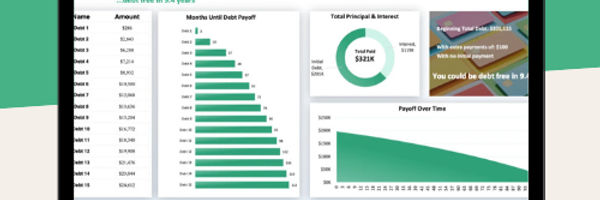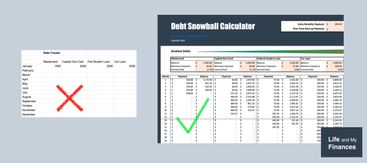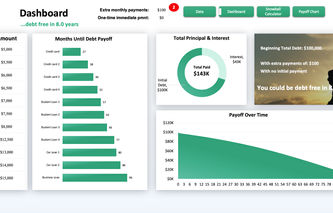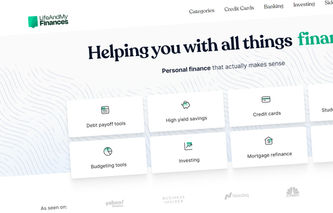If you’re looking for the perfect number of credit cards to build your credit, I’ve got bad news. There is no right answer to how many credit cards you should have.
The average American household has over $6,000 in credit card debt, and two to three credit cards. But you’re not average. You’re a unique person in a specific situation. If you’re going to press us for an answer, having two cards across different providers maybe a good way to manage your credit. But make sure you read the whole breakdown to make an informed decision.
Even though a lot of people use more than one credit card, not many understand how to use multiple cards properly. If you’re already asking “when should I get another credit card?”, you need to know what impact credit cards have on your credit score. If you're already convinced you need another card, be sure to check out our list of the best credit cards.
More articles on credit cards:
What Is a Good APR for a Credit Card (What Annual Percentage Rates are Low, Average, and High)
80+ Credit Card Statistics: Must-Know Facts About Credit Cards
Does Having Too Many Credit Cards Hurt Your Credit?
You know that getting a credit card can have a positive impact on your credit score, but does opening multiple credit cards hurt your credit? The short answer is, yes, it can.
Applying for credit cards can lower your credit score. How? It’s all about how often your credit report is pulled. And now you’re asking what that means, right? Hold on, and I’ll tell you.
What the Heck Is a “Hard Pull”?
Here’s how it works. After you apply for a credit card, the provider requests to view your credit report and see your history. That’s called a “hard pull”, and it can stay on your report for two years.
Every time you get a hard pull on your credit report, it causes your score to dip. There’s not much you can do about these appearing on your credit report, but you should learn how they work and how they impact your credit rating.
That doesn’t mean you can’t apply for multiple credit cards, but it means you should be smart about how you do it. If the reason you want a new card is to build credit, you don’t want to start by lowering your score. If you do it right, you can have a positive impact.
Don’t apply for too much, too soon
Having too many credit cards doesn’t hurt your credit, but applying for them too quickly does. Every hard pull causes your score to dip, but give it time and it’ll recover. But not if you do it again, and again, and again. It’s like your Grandma told you, don’t keep picking at the scab.
How often you apply for a credit card will affect whether you get another one at all. Not just that, it could be a factor in how your credit looks for years to come. Remember, personal finance is about the long game.
Read more:
Apply to more than one provider
Why is it better to have credit cards from different companies? By spreading the love, more data can be reported back to credit agencies about how you use your cards. It can help them build a more detailed view of your overall finances and could bump up your score.
It can also help you to establish credit with different banks, which could help when you want another card, or even a loan.
How Often Can You Apply for Credit Cards?
So, how often should you apply for a credit card? And how many credit cards can you open in a year? Well, there aren’t any hard and fast rules I can give you here. And there aren’t any official rules on applying for multiple credit cards at once, either.
That doesn’t mean credit cards are the Wild West of financial products (although there sure are a few cowboys out there). Different lenders have their own rules on how many cards you should have. Two of the major card issuers have the 5/24 rule, meaning you won't get a new card with them if you’ve opened five or more credit cards with any provider in the last twenty-four months.
Pro tip, don’t acquire credit cards too quickly. Getting a bunch of credit cards within a year or two implies to lenders that you’re looking to go into debt fast… and that you might have difficulty paying it back. That could label you as a high-risk borrower, and result in your credit score going down.
That’s one risk, but we’ve got more below. If you’ve got a card you want in mind, check your eligibility with the provider’s rules first. That way, you'll know if you already have the maximum number of cards you’re entitled to.
The Benefits of Multiple Credit Cards
Building Your Credit History
Building good credit is all about showing lenders you can manage your debts. Having a couple of credit cards is a way of proving that. More cards mean more opportunities for providers to report your spending habits back to credit bureaus. That gives future lenders more evidence that might help them in giving you credit, or even a mortgage.
Payment history is the most important factor for your credit score, and by being on your game, you can make the system work for you. As Rod Griffin, Director of Public Education at Experian, said, ‘’Make a purchase, pay it in full each month and keep your balances low. You don’t need to have a lot, just a couple [of credit cards] are sufficient for building a strong credit history and good credit scores.’’
Take it from Rod, when building credit, it’s not essential to have a lot of cards. It is essential to keep on top of your debts. By regularly using and paying off multiple cards, you’ll soon end up with a stable credit history. But what if you want to know how many credit cards you should have to build credit in the first place?
How Many Secured Credit Cards Should I Have?
If you’re starting out, you might be asking how many secured credit cards you should have to build your credit quickly. Sorry, but you’re asking the wrong question. When you’re building credit, it’s not really about how many cards you have, it’s all about how you use them.
If you’re not used to using credit, start slow. Have one secured card, build up your history and your score, and then upgrade with your provider to an unsecured card. I hate to sound like anyone’s Dad, but getting ahead in personal finance is all about one thing--responsibility. The OpenSky® Secured Visa® card is a secured card that we recommend.
There's no credit check, you can choose your limit amount (as low as $200), and it reports monthly to the three major credit bureaus.
Credit Limit Vs Utilization
With more credit cards comes more spending. But how much of your credit card should you use? In other words, what should your credit utilization be? Credit utilization is the amount of credit you’re using out of how much you have in total.
To calculate your utilization, take the balance on your credit cards and divide that by the total amount of credit you have. Let’s imagine you have one card with a $1,000 limit, and another with a $2,000 limit. That’s $3,000, and your total amount of credit.
Now, you go and buy that big-screen TV you’ve had your eye on. It costs $1,500, and you put it on your card. You’re using 50% of your credit, known in financial jargon as the credit utilization. It’s best to keep your credit utilization low, and not to go above 30% if you can help it.
That’s where having two credit cards can come in useful. By spreading your spending across multiple cards, you can keep utilization at a lower level. Think about that TV again. With three credit cards, and an overall $5,000 limit, you’re only using 30% of your credit utilization when you spend $1,500.
Congratulations, you’re working the system! Even if you have a card that you don’t use, that can be a way of keeping utilization lower. Think of it in simple terms: Double the cards could mean half the utilization.
Making the Most of Rewards
A lot of cards offer great cashback rewards, travel miles, or even money-off events. By combining credit cards, you can maximize your benefits. Be honest, the rewards are kinda half the reason you want a credit card in the first place.
If you’re a student, you might want a card that gives you discounts on live events, and another that gives you great cashback at gas stations when you drive home every holiday. Pairing up reward cards can give you more flexibility, too. If you need a card with good cashback on everyday purchases, but still want to take advantage of travel miles offered on more specialized cards, you might have both and manage your spending to earn in both categories.
Certain credit card pairings can also work well together for rewards. If you have two cards with the same provider, the chances are that you might earn extra points or rewards by transferring a balance across cards.
The key takeaway here is to make sure that your credit cards pair well with your lifestyle. There’s no point in having a credit card with great cashback rewards on eating out if you never go to restaurants. Doubly pointless to have two.
Managing Your Debts
You’ve probably seen the term “balance transfer” a lot when looking at credit cards online. If you’re not sure what it means, basically it’s a way of taking debt from one, high-interest account and placing it in another, lower-interest one. That way, you have less to pay.
What we’re saying is—having more than one credit card can save you money! Consolidating your debt onto one card can have a few benefits. A new credit card might come with an introductory 0% APR for the first year. That seems great for anyone who wants to avoid paying a lot of interest on their debt. You’d likely pay less in fees, and you can keep track of and manage your debt.
When it comes to reasons to have two credit cards, this one is a no-brainer! Be careful, though. Among the terms and conditions on a lot of cards, there can be a charge for a balance transfer. Usually, this sits at around 3%-5% of the balance you’re moving. Although it’s not too high, it’s still worth shopping around for the best deal.
If you want another card, for this reason, try looking into those made especially for balance transfers. These might not offer the same 0% introductory APR, but will more likely have a lower interest rate for a longer period. That could be useful for anyone wanting to restructure their debts, or if you have a large amount you’re paying off.
Check out our free credit card payoff calculator and other personal finance products to manage your debt.

Lay out your credit card debt with the minimum payments and interest to see how long it will take to pay off!
What you will get:
Interactive dashboard
Customizable to your needs
Stay on track with charts and graphs
Suitable for up to 16 or 32 debts!

The Disadvantages of Having Multiple Credit Cards
Missing a Payment
This is the number one problem with having too many credit cards. If you have cards with different payment dates, the chance of missing one and ruining your credit is high. As we said above, payment history is the most important factor in getting a good score.
Heard of a FICO credit score? It’s one of the major credit scorers, and35% of the calculation for your score comes from your payment history. By missing a credit card bill, you’re effectively telling lenders you’re not responsible enough to manage your debt.
That can have a devastating impact on an application for any line of credit, whether it’s another credit card or a car loan. Or even a mortgage. If you have over one card, you must keep a track of your due dates and your spending.
Most credit card companies offer auto-pay features, where the money you owe is taken directly from your bank account. These are great, and you can find them on a lot of banking apps. If you prefer to do things a little more manually, set a few reminders that’ll stop you from missing a payment.
Breaking Your Budget
Unlike a debit card, you’ll keep spending on a credit account until you either hit your limit or get declined. And once that happens, you might end up with two or three credit cards worth of debt and mounting interest. How important is it to pay off your cards?
It’s the most important thing you have to do. It’s easier than you think to fall into a debt spiral, and it happens to more people than you think. According to TransUnion’s latest Consumer Pulse survey, more consumers this quarter have said they’ll not be able to pay their current bills in full. Luckily, there are ways to manage it.
One great tool is our Debt Snowball Calculator, which you can use to help free yourself from months, or even years, of interest-only payments. Want to set up your debt snowball spreadsheet in just a few minutes? Check out our digital tools on Etsy. Make a small investment, get your instant download, and create a plan to become debt-free today.


One of our users, Redd, had this to say:
“Great product! I can actually breathe a little better after entering all of my information and seeing a light at the end of the tunnel! Great customer service as well! Highly recommend.”
Having too much debt across credit cards can also increase your debt-to-income ratio. It sounds scary, but it’s financial jargon for your monthly debts divided by your monthly income. It’s calculated as a percentage, and it’s best to keep this number as low as you can, targeting no more than 43% because beyond that you’re less eligible for products like Qualified Mortgages.
If you’ve built up a lot of debt on credit cards, this number will be higher. Then you might have real trouble finding a lender who will accept you. The best way to avoid this happening to you is to keep a close eye on your spending. Keep track of every payment on every card, and make sure that you know what you owe before a bill comes due.
Lowering the Age of Your Credit History
This might be something you’ve never thought about before. In simple terms, every time you open a new credit card, your average credit history gets a little younger. Having a lengthy credit history isn’t the most important factor determining your credit score, but it still counts. If your accounts have a low average age, this can be a red-flag signal to lenders that you regularly take out lines of credit.
They might think that you have trouble managing your debts. It’s also the reason you should think twice before closing any old accounts. If you want to know how long should you keep a credit card open, the answer is as long as you can.
Even if they sit with a balance of zero, they help your score by lengthening the average age of your credit. The more credit cards you open, the riskier you will look to future lenders.
Raising the Risk Level
Remember what we said about a “hard pull”? Well, that’s another reason having too many credit cards, or at least making too many applications, can be a bad idea. Although there isn’t a time limit on how long you have to wait between making applications, it’s considered best not to make a lot at once, or too many close together.
That can damage your credit rating, and raise another red flag to lenders that you aren’t managing your debts well. Credit card companies want you to have their cards, but they don’t want you to be desperate for fresh credit you can’t pay back.
Things to think about before applying for a new credit card
Pay Attention to Your Credit History
If you want to find out whether you might get a new card, it’s vital to keep a close watch on your credit score and history. If you find yourself wondering, “How can I check how many credit cards I’ve had?”, this is a way of doing that and finding out what all those forgotten cards have done to your credit. But, and no judgment here, you should really know how many credit cards you’ve had.
Okay, tiny bit of judgment. Checking your credit report is a good way of finding areas you can fix to improve your credit. If you think that there are a few holes in your report, lenders will likely think so, too. Before you apply for a new card, make sure that you fix any problems with your current credit.
And then wait a while if you can and watch your score tick up. It could even result in a better deal on a new card.
How Much Credit Do You Need?
If you think you can live with a lower limit, then it’s better not to stretch yourself. There’s no reason to take on a high credit limit if you don’t need it. That way, you’ll avoid the risk of overspending and landing in debt. Consider what big-ticket items to buy on a credit card and whether there might be better ways to pay for them.
If you already have over one card, look at your credit utilization and think about whether you should pay down on your existing cards before opening a new one. If you’ve got higher than 30% utilization, it’s a better idea to pay off what you already owe before taking on more.
Find out what you need by looking at our easy spending comparison tool. It can show you exactly what you’re already spending and where you might already save.
Are the Perks Worth the Risk?
Ask yourself if you’ll use the rewards you’ve signed up for. If not, you might commit yourself to a credit card you don’t want and can’t afford. Rewards and cashback are great ways to make the most out of cards, but make sure that you shop around to find the ones that suit your lifestyle.
Understanding Terms and Conditions
How often have you read the fine print on any contract? Sometimes you can get away with that, but you definitely can’t with credit cards. There’s no guarantee that you’ll be eligible for more cards with the provider of your choice, and that’s a quick way to get declined and put a smudge on your credit report. Hidden among the jargon is some important information that might affect your choice.
A 0% APR is great if you want to consolidate all your debts to one card, but that 5% balance transfer fee might be more than you want to pay. Don’t just skim. If you’re going to take on another card, make sure everything is right for you. From the interest rates to the annual fees to the rewards.
Better Ways to Increase Your Credit Score
Taking on a credit card is a quick and easy way to increase your score. That’s true, but if that’s the only reason you want more than one card, there might be better options. A personal or student loan might give you more protection from overspending. Or how about mixing credit streams by taking on a cellphone plan? Maybe you could introduce your rental payments into your credit file.
Having another card might be a good way to build your credit, but it’s not necessarily the best route for opening up lines of credit. Sure, if you never miss a payment you’ll improve your score. But by mixing credit streams, you’ll make yourself more attractive to mortgage or car loan providers.
Finding the Right Balance
You should only have as many credit cards as you really need. If you want a key takeaway, that’s it. You might need more than one, if you’re optimizing for rewards or transferring a balance to manage debt, but you really shouldn’t have more than two or three overall. Five is often considered too many, especially if you get them in less than two years. And once you have them, hang onto them.
Don’t close accounts or get new cards you don’t need. Some providers might be fine with you having five credit cards, but you’re playing the long game here. You need to think about how you’ll manage that much credit over time, and if you can cover any debts that might stack up. Stay smart, stay responsible. Don’t have too many credit cards.


.jpg)


